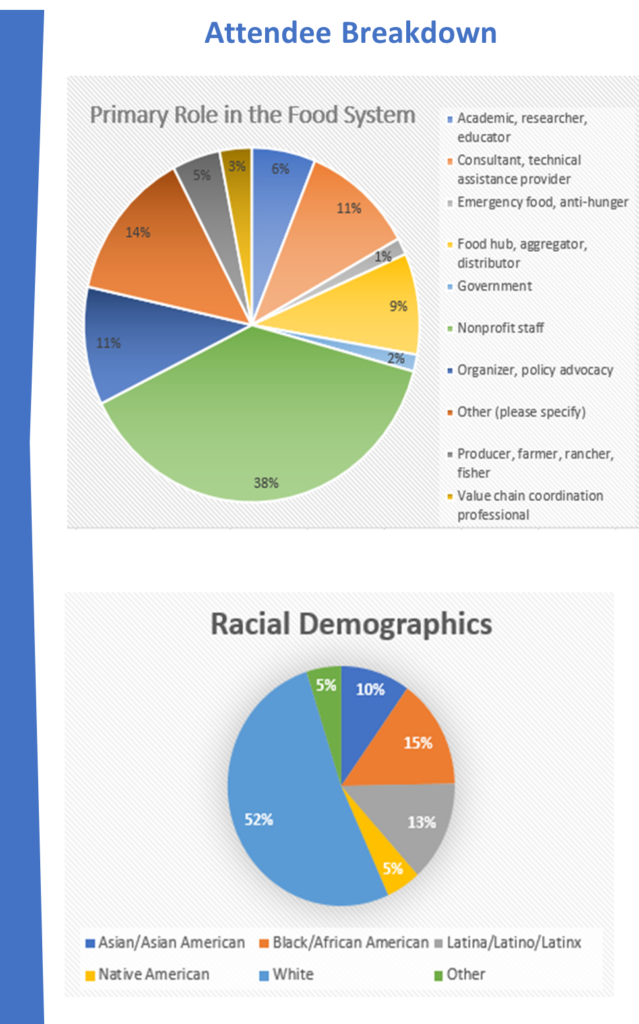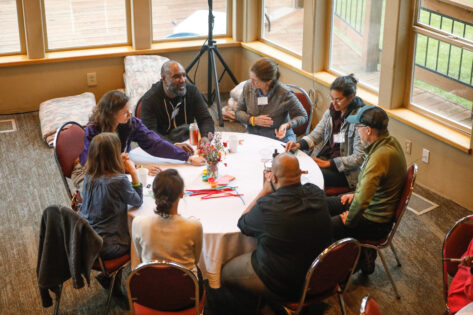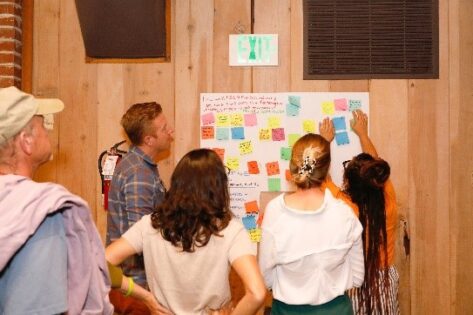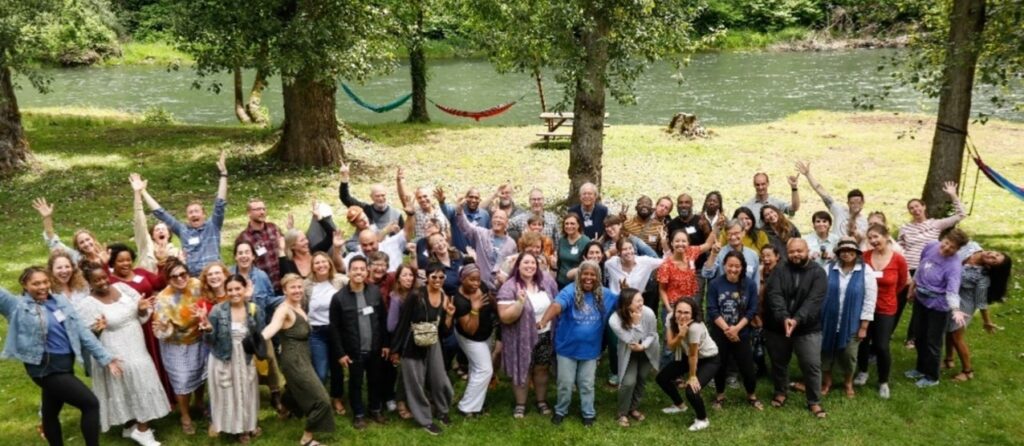
July 15, 2022 — In early June, 75 Food Systems Leadership Network (FSLN) members and partners new and old gathered together along the Molalla River in Canby, Oregon for several days of relationship building, sensemaking, and dreaming about the future of the network. And wow, what a week it was!
What we learned, discussed, and co-created in Oregon will help guide the next several years of FSLN strategy and programming. The FSLN touches over 2,500 people; the 75 people who were together in Oregon are just a small part of this growing network. In this recap, we share what we did together, the ideas that emerged for the FSLN, and where we’ll go from here to ensure that this strategic planning process is an inclusive and collaborative effort reflective of the needs and dreams of all members of the Food Systems Leadership Network. Please reach out to Susan Schempf at susan.schempf@winrock.org with any questions or comments.
****
The stated objectives of the 2022 FSLN Vision and Strategy Gathering were to:
Via deep collaboration between the FSLN backbone team and a brilliant design team of 10 FSLN members, we aimed to create an agenda that met those goals, and left plenty of room for rest, joy, and emergence. So, who was there and what did we do together?
We grounded ourselves in place with joy and curiosity.
During a jubilant outdoor welcome reception– with music from local musicians Joe and Briar, snacks from Portland-based, Black-owned Charcuterie Me, and drinks from Finnriver Farm & Cidery in Port Townsend, WA– food systems leaders from across the country reconnected with old colleagues and friends and met new ones.
“I am returning to my work after the FSLN gathering with a renewed sense of excitement, of hope ,and of connection. Thanks to the time and space to gather, I will collaborate with my new and old friends even more intentionally in the weeks and months ahead.”
On Monday evening, Eddie Hill, local leader and Co-Founder of the Black Food Sovereignty Coalition, led us through a grounding ceremony. Eddie shared his connections to the land and this movement, oriented us to the history of BIPOC ingenuity, stewardship, and discrimination in the area, and invited us to set intentions for the week ahead. We shared FSLN’s offering of financial reparations to several local organizations supporting BIPOC land stewards and farmworkers: Black Oregon Land Trust (BOLT), Pineros Y Campesinos Unidos del Noroeste, and Oregon Native American Chambers, and heard from staff at BOLT about their work in the region.
Food systems leaders from the Pacific Northwest (Nora Frank-Buckner with Tahoma Peak Solutions, Aaron Vargas with Ecotrust, Melony Edwards with the Wallace Center and National Young Farmers Coalition, and Vero Vergara with Groundwork Food Hub) painted a picture of the challenges and momentum facing regional food systems in the Pacific Northwest through a panel conversation moderated by FSLN member Elliott Smith (Kitchen Sync Strategies). Panelists discussed indigenous rights, the challenges of accessing affordable land, and the increasing connectivity across the region.

We developed a sense of community and took stock of the current state of local and regional food systems.

We co-created and agreed to a set of Cultural Agreements to guide how we each show up in FSLN curated spaces. These will be refined and presented to the network in the coming months for feedback and approval. We can’t wait to share them with you!
Design Team member Miles Gordon and strategic consultant Dwayne Wharton got people moving and talking about what’s been bubbling up in our communities and our work, where we’re feeling stuck, and what we’re excited about. FSLN backbone team Elizabeth Atwell and Design Team members Eowyn Corral and Arlo Bush facilitated racial affinity groups, offering space for folks of common racial identities to connect, share, and support each other.
We continued our learning into the evening for a fireside chat between food systems network leaders who shared about their work, the value of networks, and their ideas for how the FSLN can complement and add value across this movement. Peter Allison from Farm to Institution New England, Karen Bassarab from Food Policy Networks, Eddie Hill from the Black Food Sovereignty Coalition, Karen Spiller from Food Solutions New England, Katherine Un from National Young Farmers Coalition, and Brennan Washington from Southern SARE helped us see the power and reach of our interconnected networks.

100% of gathering survey respondents will make changes to their work or take action based on what they learned at the gathering
100% of respondents both formed new relationships and strengthened existing relationships
93% feel more confident in their capacity as a food system leader
73% sharpened skills relevant to their work
After multiple conversations and connection points, we recognized some common themes about the state of the movement for equitable food systems:
Throughout all the conversations, we heard an incredible amount of optimism, curiosity, and dedication that exists within this group of food systems movers and shakers. In the words of FSLN member Arlo Bush, “we each seem to have a piece of the puzzle, we just don’t know what the puzzle box looks like.”
“Relationships were the most valuable resource provided during the Gathering. Thanks to the several discussions I had with colleagues new and old, I left Oregon buzzing with inspiration and clarity.”
We talked about the unique role that the FSLN can provide in serving this movement & the leaders within it.
FSLN members are seeking deep and meaningful connections with fellow food systems leaders to share the tools, skills, and ideas that are driving change across the country. The FSLN exists to meet this need.
During our conversation, a powerful metaphor for the FSLN emerged: that of a safe harbor.
Like a harbor, the FSLN provides the safe refuge that food systems leaders — the vessels for change — navigate in and out of. These leaders bring and exchange resources and learnings from their respective journeys to other vessels in the harbor, and then navigate back out, bringing new ideas and new information to their respective destinations. Like a harbor, folks think of the network as a nurturing space that facilitates the exchange of resources, skills, and know-how to allow each boat to safely cross the ocean.

And we had fun!
Amongst the facilitated conversations, structured networking, and workshopping, we created spaciousness. Folks jumped in the Molalla River, took naps when they needed to recharge, and hung out in the hammocks. The knitting materials that Virginia Clark brought were a hit throughout the week and Eowyn Corral and Patti Smith created a collaborative arts and crafts project. Karen Spiller dominated at the card game Uno and there were some intense games of dominos late into the evening! DJ Rev Shines got us moving on the dancefloor and the fire tenders made sure the flames were steady and the ‘smores aplenty.
This was a co-created event that provided space for the connection, reflection, and dreaming that has been so dearly missed over the past several years. This nontraditional approach to strategic planning and movement building has given the FSLN backbone team a whole lot of goodness to distill and share. We recognize that the folks who contributed to the discussions were just a small fractal of the network, and are excited to host a virtual event on November 2 to invite additional feedback, inspiration, and contributions to the FSLN’s future.
Thank you again for your commitment to this work and this network. We can’t wait to see where it takes us!
”This gathering was an inspiring opportunity to connect with so many passionate and hardworking food systems leaders. The experience certainly helped me understand my role in this work and how best to focus my skills development for my organization, my community, and this movement.”
